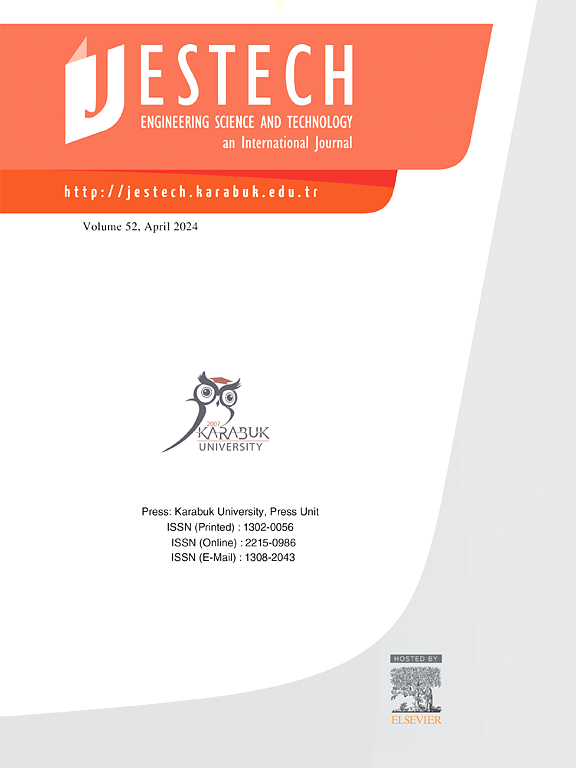06 February 2023 Kahramanmaraş earthquakes (Mw = 7.8 and 7.6) field observations and preliminary assessment report
IF 5.1
2区 工程技术
Q1 ENGINEERING, MULTIDISCIPLINARY
Engineering Science and Technology-An International Journal-Jestech
Pub Date : 2024-11-26
DOI:10.1016/j.jestch.2024.101898
引用次数: 0
Abstract
Türkiye, in Pazarcık and Elbistan districts of Kahramanmaraş, two major earthquakes occurred on 6 February 2023. 11 provinces were directly affected by these earthquakes, and 239,151 buildings were severely damaged or destroyed. In this article, many structural deficiencies and errors, such as the quality of building materials, soft and weak storeys, short column effect, strong beams-weak columns, oversized and heavy overhangs, frame discontinuity, reinforced concrete columns with insufficient stirrup, constructive details, and workmanship errors are observed, and the earthquake regulations requirements are compared. Thus, an overview of the damages observed after earthquakes is provided. The findings revealed that many heavily damaged or collapsed buildings did not meet Türkiye building earthquake code requirements.
2023 年 2 月 6 日 卡赫拉曼马拉什地震(Mw = 7.8 和 7.6)实地观测和初步评估报告
2023 年 2 月 6 日,土耳其卡赫拉曼马拉什的帕扎克和埃尔比斯坦地区发生了两次大地震。这两次地震直接波及 11 个省,239 151 栋建筑物严重受损或被毁。本文观察了许多结构缺陷和错误,如建筑材料质量、软弱层、短柱效应、强梁弱柱、过大过重的悬挑、框架不连续性、箍筋不足的钢筋混凝土柱、构造细节和工艺错误,并对抗震法规要求进行了比较。因此,对地震后观察到的损坏情况进行了概述。研究结果表明,许多严重受损或倒塌的建筑物不符合土耳其建筑抗震规范的要求。
本文章由计算机程序翻译,如有差异,请以英文原文为准。
求助全文
约1分钟内获得全文
求助全文
来源期刊

Engineering Science and Technology-An International Journal-Jestech
Materials Science-Electronic, Optical and Magnetic Materials
CiteScore
11.20
自引率
3.50%
发文量
153
审稿时长
22 days
期刊介绍:
Engineering Science and Technology, an International Journal (JESTECH) (formerly Technology), a peer-reviewed quarterly engineering journal, publishes both theoretical and experimental high quality papers of permanent interest, not previously published in journals, in the field of engineering and applied science which aims to promote the theory and practice of technology and engineering. In addition to peer-reviewed original research papers, the Editorial Board welcomes original research reports, state-of-the-art reviews and communications in the broadly defined field of engineering science and technology.
The scope of JESTECH includes a wide spectrum of subjects including:
-Electrical/Electronics and Computer Engineering (Biomedical Engineering and Instrumentation; Coding, Cryptography, and Information Protection; Communications, Networks, Mobile Computing and Distributed Systems; Compilers and Operating Systems; Computer Architecture, Parallel Processing, and Dependability; Computer Vision and Robotics; Control Theory; Electromagnetic Waves, Microwave Techniques and Antennas; Embedded Systems; Integrated Circuits, VLSI Design, Testing, and CAD; Microelectromechanical Systems; Microelectronics, and Electronic Devices and Circuits; Power, Energy and Energy Conversion Systems; Signal, Image, and Speech Processing)
-Mechanical and Civil Engineering (Automotive Technologies; Biomechanics; Construction Materials; Design and Manufacturing; Dynamics and Control; Energy Generation, Utilization, Conversion, and Storage; Fluid Mechanics and Hydraulics; Heat and Mass Transfer; Micro-Nano Sciences; Renewable and Sustainable Energy Technologies; Robotics and Mechatronics; Solid Mechanics and Structure; Thermal Sciences)
-Metallurgical and Materials Engineering (Advanced Materials Science; Biomaterials; Ceramic and Inorgnanic Materials; Electronic-Magnetic Materials; Energy and Environment; Materials Characterizastion; Metallurgy; Polymers and Nanocomposites)
 求助内容:
求助内容: 应助结果提醒方式:
应助结果提醒方式:


